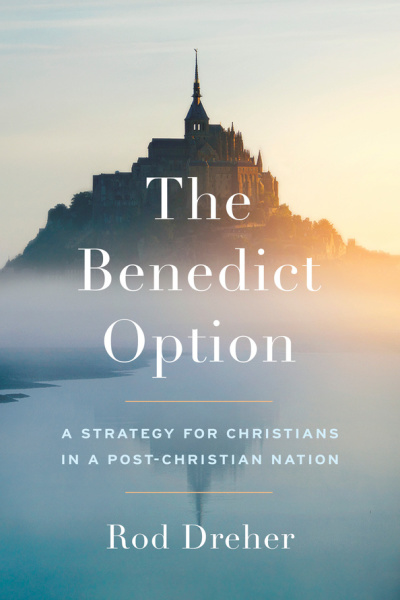Dark Age for Christians Coming, Prepare Like a Monk, Rod Dreher Says (Interview)

If the spiritual crisis in America is to be thwarted, Christians must strategically withdraw from politics and form communities patterned after St. Benedict, a monk born in 480 A.D., says Rod Dreher, author of The Benedict Option: A Strategy for Christians in a Post-Christian Nation.
The "Benedict Option" is Dreher's prescription for the preservation and renewal of the Christian faith in a contemporary society that — including churches and groups that promote distortions of the Gospel — stands fiercely at odds with Orthodox Christianity's core tenets. This requires a deliberate, intentional separation from the culture for a time and to do this, Dreher draws upon the wisdom and life of Benedict of Nursia, who is considered the founder of Western monasticism.
As both the Left and major cultural institutions moved aggressively against conservative Christians and their freedoms in recent years and show no signs of stopping, he says Christians in the United States will inevitably experience an "internal exile" in a country they thought was their own. But this is a necessary thing, he believes, particularly in light of the havoc the sexual revolution has wrought.
Yet the suggestion of utilizing the Benedict Option and withdrawing from society causes unease for many Christians, especially among conservative evangelicals, Dreher explained in an interview with The Christian Post last week.
His book and previous writing on this subject is dismissed by some progressives as a "fantasy" stemming from a white Christian persecution complex while others regard it as doomsday fear-mongering. Readers will observe, however, that he's not saying Christians should relinquish political life altogether. The author does not refuse the "alarmist" label but insists he has to shout since still so many are deaf to reality, metaphorically speaking.
Dreher, 50, who is the senior editor of The American Conservative and an Eastern Orthodox Christian, told CP that Christians simply cannot offer the world what they themselves do not have. And that is because, to a large extent, American culture and politics has captured the Church. Churches have ceased being salt and light and the Gospel message, including how it is to be lived, has been "hollowed out from within."
To retrieve this, his alternative "option" calls for an intentional separation from culture for a time to build vibrant communities ordered around prayer and time alone with God, as well as fresh thinking about building conscience-shaping institutions that are distinctly Christian.
While he has never belonged to an evangelical Christian tradition, Dreher said evangelicals have told him that great concern is present in their ranks about disengaging public life because of the not-so-distant memory of Christian withdrawal from culture in past decades.
"They don't want to repeat what they believe was a big mistake," Dreher said. "And I get that."
"But I think that part of it, too, is a less respectable reason, which is that people don't want to give up status. They don't want to give up the things that they crave. Because all of us are in this culture, we want to be part of things. We don't want to be the sort of people who are looked down on as outsiders."
The election of President Donald Trump and the Republican majority might be a temporary reprieve from secular leftist attacks on Christians' rights, he said, but more nefarious forces are at work and faithful Christians would do well to prepare for what appears to be evil times ahead. Given that Jesus withdrew from the public eye from time to time, His followers need to find a way to do likewise.
In 2004, a friend recommended to Dreher that he read Alasdair McIntyre's 1981 book, After Virtue, in which McIntyre argued that the West was at a moral crossroads in civilization, that it mirrored the Roman empire when it fell in 476 A.D.
"McIntyre said that back then there were men and women of virtue who quit trying to shore up the falling empire and instead devoted themselves to building new forms of community within which the tradition of the virtues could survive the dark age to come," Dreher recounted.
Benedict was one such virtuous person, a pious Christian layman who abhorred the rampant immorality he encountered in Rome where he had been sent to finish his education as a young man. Benedict wrote, in Dreher's words, "a rather boring" guidebook called The Rule, which describes how to run a monastery. The Rule outlines how Christian life together should be lived, ordered around prayer, contemplation, and hospitality.
Because of the moral chaos of the European continent at the time, the Church not only preserved the faith but was the only refuge of stability for people. Benedict and the monastic movements in the subsequent centuries after him ultimately paved the way for the rebirth of civilization.
"So, I asked myself, 'What would a Benedict of our time have to say to us, to Christians today?"
To that end, Dreher offers The Benedict Option as a multi-faceted formula for Christianity's renewal in modern times, paving the way for a rebirth of its own. In each chapter he explores how Christian participation in every sphere of society should be radically reconsidered, eloquently articulating his ideas for the way forward.




























